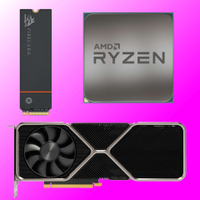Intel's new 14th Gen chips are almost a carbon copy of its 13th Gen, fortunately including the price
Raptor Lake refresh is here, with no alarms and no surprises.
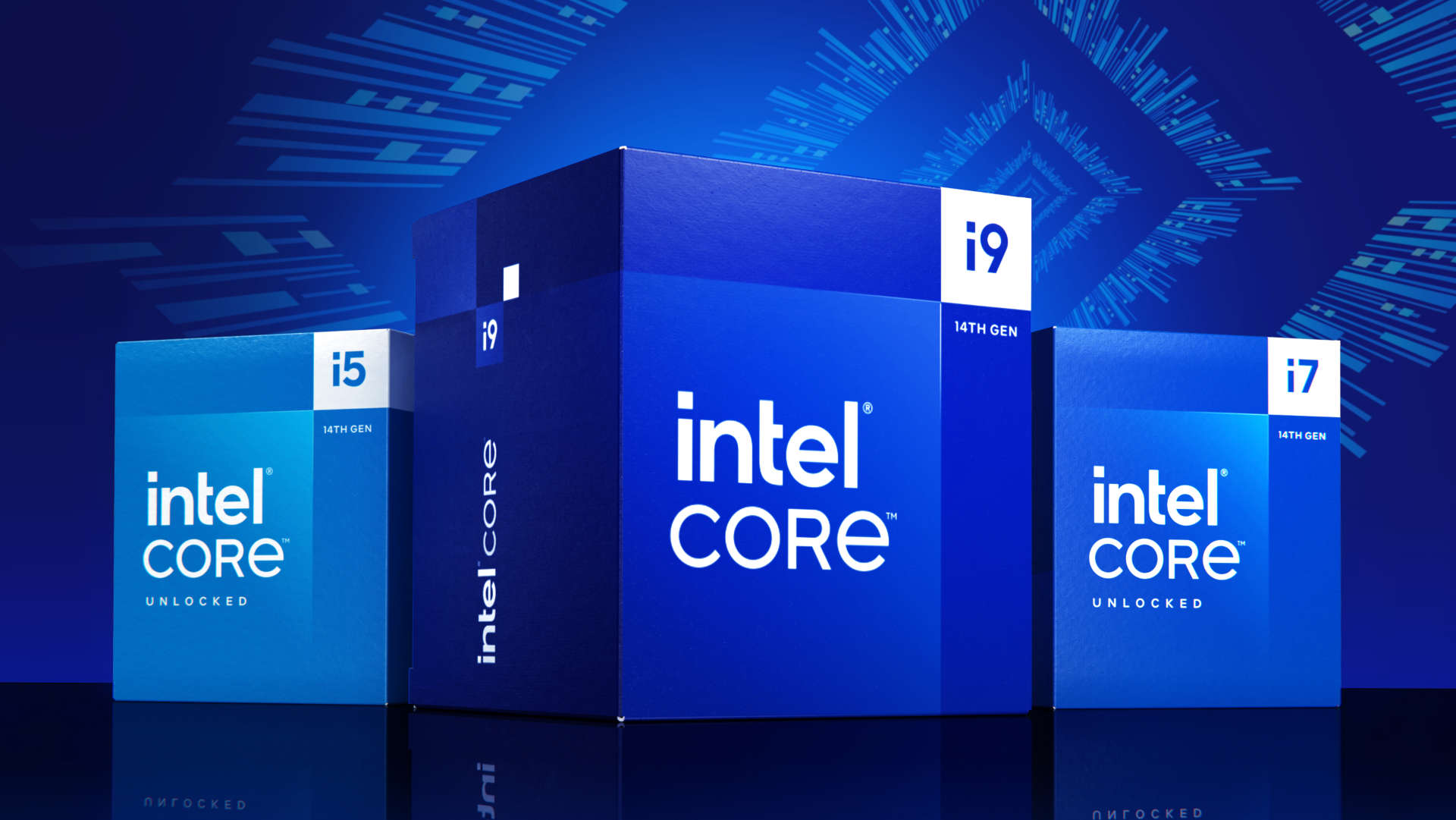
After weeks of leaks and rumours, Intel has officially announced its 14th Generation of Core desktop CPUs, starting with a total of six new models. There's the Core i9 14900K, i7 14700K and i5 14600K, along with KF variants missing the iGPU component. Prices for each one are the same as the previous generation and you're getting a bit more clock speed, an update to the i7 configuration, and that's mostly it.
Not that you should be surprised one bit as these chips are internally the same as the Core i9 13900K and so on. In other words, Intel is still using the Raptor Lake architecture for these processors and the higher clock speeds, and other differences, come entirely from how the chips are selected from the binning process during manufacturing.
That means the i9 14900K and 14900KF still sports an 8+16 P-core/E-core configuration but the base and boost clocks are higher than those for the 13900K and KF. For the P-cores, the clock range starts at 3.2GHz and goes up to 5.6GHz for the Max Turbo Frequency (MTF), and 6.0GHz for the Velocity Boost Frequency. The E-core clock range is 2.4GHz through to 4.4GHz (MTF).
The small, 0.2GHz clock speed upgrades haven't resulted in higher power limits, as the TDP (PL1) and PL2 values are still 125W and 253W, respectively. What has changed, though, is the core configuration for the stars of the Core i7 lineup, the 14700K and 14700KF. Previously, this was an 8+8 setup, but Intel added an extra block of four E-cores to the new CPU, so both 14700 models are 8+12.
Those extra E-cores will come in handy for heavily multithreaded applications, and the total amount of L3 cache has changed from 30MB to 33MB. Like their bigger brothers, the 14th Gen i7 chips only boast a minor boost in clock speed. Base values are still at 3.4GHz for the P-cores and 2.5GHz for the E-cores, but the MTFs are now 0.1GHz higher.
Moving down a tier to the i5 14600K and 14600KF, there are no extra cores to be found nor an increase to the base clocks, but the P-cores now offer an MTF of 5.3GHz (0.2GHz higher) and the E-cores can now run up to 4.0GHz (a 0.1GHz increase). All of the new i5 and i5 CPUs have the same power limits as their 13th Gen predecessors.
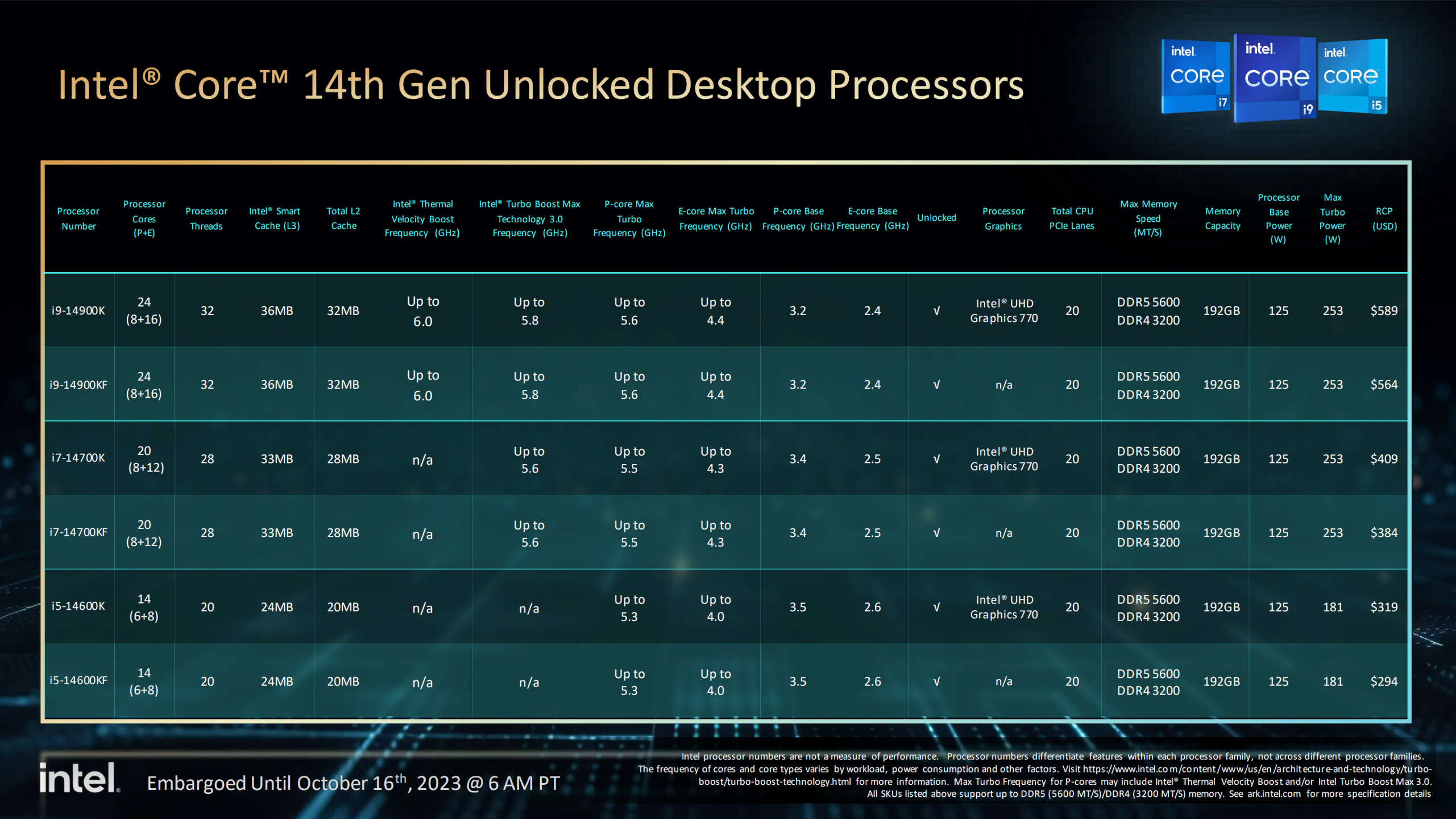
One other change across the board is the total amount of supported memory. Previously it capped out at 128GB but it's now 192GB, though lots of motherboards for the 13th Generation CPUs already support the higher amount. That's because there's a fairly recent trend towards 24GB and 48GB DDR5 modules, so the change in specifications is probably just a formal recognition of this.
Keep up to date with the most important stories and the best deals, as picked by the PC Gamer team.
As with all new processor releases, Intel is claiming that the new i9 14900K is better for gaming than AMD's offerings. Figures showing the chip against the Ryzen 7 7800X3D, Ryzen 9 7950X, and Ryzen 9 7950X3D put Intel's latest processor is a good light, but the proof will be in the pudding, as they say, and we're currently working on that dish right now.
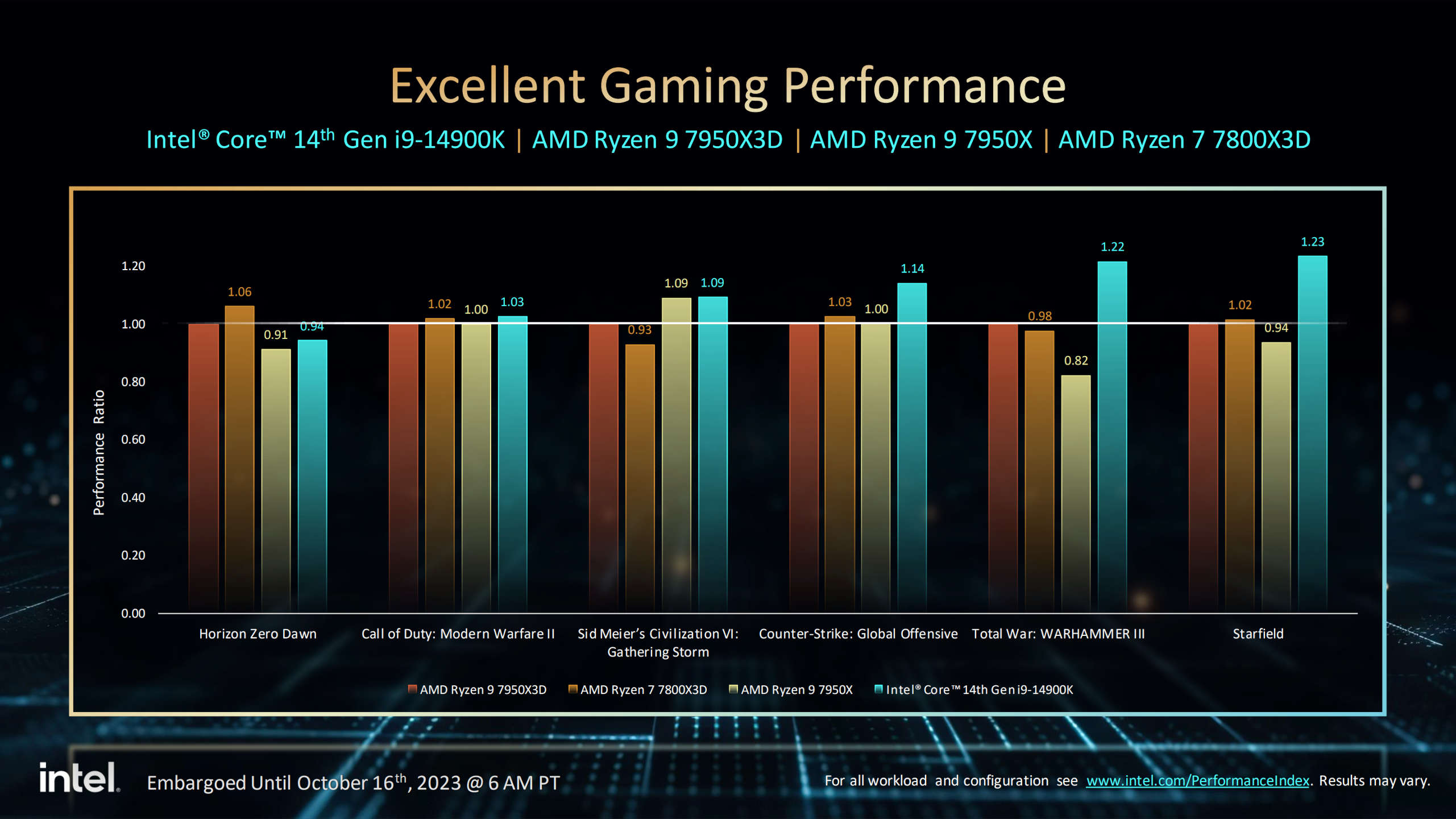
The last thing that's new in this launch is the Intel Application Optimization (APO, for short). Precisely what this does is a bit of mystery at the moment, as all Intel has said is that it's a 'new scheduling technology'. What we do know is that it only works in Windows and just for games that are on Intel's whitelist, which rank few in number at launch, though you can potentially see a healthy boost in performance.
APO won't work on every game nor every 14th Gen Core CPU, and it sounds like you'll need to have some kind of Intel software package installed for this to actually work. We'll let you more once we do!
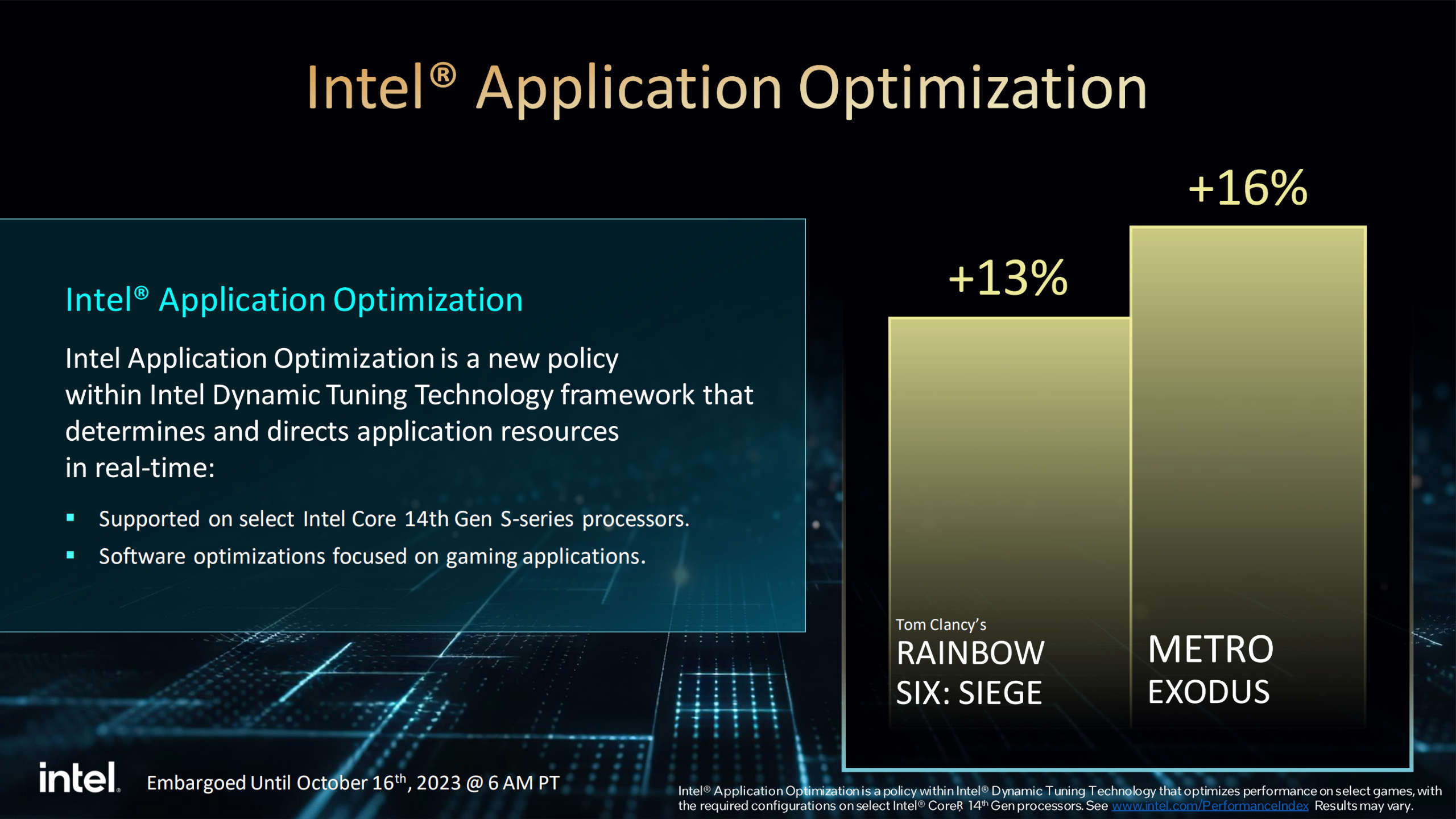
With such a small change over the previous generation of Core processors, Intel would have run into a spot of trouble if they'd increased the prices but since they're the same (or at least, they are for these particular models), there's no real reason to buy a 13th gen i9, i7, or i5 unless they're on sale. The good news is that those older chips can easily be found under their MSRP so if you're after a bargain, now is the time to shop around and see what you can pick up.
If you are wanting to get Intel's latest and greatest, then you won't have to wait very long at all, as the 14900K, 14700K, and 14600K (plus the KF variants that have the integrated GPU disabled) will be on retailers' and OEM's shelves on October 17.
Best CPU for gaming: Top chips from Intel and AMD.
Best gaming motherboard: The right boards.
Best graphics card: Your perfect pixel-pusher awaits.
Best SSD for gaming: Get into the game first.

Nick, gaming, and computers all first met in 1981, with the love affair starting on a Sinclair ZX81 in kit form and a book on ZX Basic. He ended up becoming a physics and IT teacher, but by the late 1990s decided it was time to cut his teeth writing for a long defunct UK tech site. He went on to do the same at Madonion, helping to write the help files for 3DMark and PCMark. After a short stint working at Beyond3D.com, Nick joined Futuremark (MadOnion rebranded) full-time, as editor-in-chief for its gaming and hardware section, YouGamers. After the site shutdown, he became an engineering and computing lecturer for many years, but missed the writing bug. Cue four years at TechSpot.com and over 100 long articles on anything and everything. He freely admits to being far too obsessed with GPUs and open world grindy RPGs, but who isn't these days?
